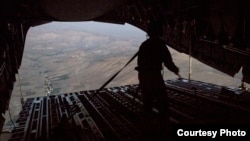As images and reports of starvation in besieged Syrian communities drew an international outcry and two rare aid convoys this month, an urgent question arose: Why not drop food and other needed supplies by air?
Humanitarian access is a key issue as the United Nations tries to get Syrian parties to peace talks tentatively set for Monday. And it's the focus of a pledging conference on Feb. 4 in London, with the leaders of countries including Germany and Iran expected to attend.
Almost five years after Syria's civil war began, the U.N. says more than 393,000 people are besieged. Food aid reached less than 1 percent of them last year. About 181,000 are besieged by Syria's government.
'We have the assets'
Aid airdrops in Syria are possible to do, the U.S. Air Force secretary noted last week. "If we're asked to do it, we have the assets, we have the people, we know how to do airdrops," Deborah Lee James told an audience at the Center for Strategic and International Studies.
Russia, the Syrian government's strongest ally, this month announced airdrops to the city of Deir el-Zour, where government-held areas are blockaded by Islamic State militants and an estimated 200,000 people are besieged.
The U.N. also has the capacity; the World Food Program has made airdrops to hard-to-reach areas in other countries. And a series of U.N. Security Council resolutions since early 2014 allow for aid deliveries without the permission of Syria's government, though their effect on airdrops is not clear.
But while diplomats, aid workers and U.N. officials say they are exploring all options to reach besieged communities, they say airdrops face deep complications both political and logistical.
Without permission from Syria's government for airdrops -- something the U.N. says it does not have -- there is the risk of Syria responding with force.
"If we fly aircraft over Syria without the permission of the Syrian government, then there is a real danger that they will take action against them. And that is not going to help anybody," one Security Council diplomat said.
'Risk of being shot down'
Valerie Szybala, executive director of The Syria Institute and the author of a report last year on besieged communities, was more blunt: "Anyone who enters Damascus airspace without the consent of the Syrian military and Russia runs a very real risk of being shot down."
For Syrians who see the U.S.-led coalition and Russia carry out airstrikes in Syria and the U.S. drop weapons to Kurdish fighters battling the Islamic State, there is frustration that food and similar aid isn't being dropped as well.
"When they bombed ISIS, did they ask the government's permission?" said Fadi Hallisso, using an acronym for the Islamic State group. Hallisso is the head of an aid organization, Basmeh and Zeitooneh, run by Syrian refugees like himself. "When they want something, they find a way to do it."
While the U.N. says all sides in the conflict have blocked the delivery of aid, it has repeatedly criticized Syria's government. The U.N. secretary-general's latest report on the crisis, dated Thursday and obtained by The Associated Press, says that since the beginning of 2015, just 13 inter-agency convoys have been approved by the government and completed, out of 113 requested.
Airdrops ruled out
Despite the need, the World Food Program has ruled out doing airdrops in Syria.
"Airdrops require approvals for use of airspace, staff on the ground to organize and distribute and a drop zone that is clear of obstacles. Those conditions are not met in besieged areas of Syria," WFP spokesman Gerald Bourke said in an email.
Some aid groups call airdrops the last resort. In general, "you need people on the ground to ensure everything is getting to the right place," said Noah Gottschalk, Oxfam's senior policy adviser for humanitarian response. After Russia dropped supplies into Deir el-Zour, activists said government security forces collected them to sell at the market.
Airdropping "lets governments have an easy quick win," said Frances Charles, advocacy director for World Vision's Syria efforts. It doesn't mean sustained access, and it draws away energy that should be spent on getting sieges lifted, she said.
But in a sign of how dire access remains in Syria, some aid workers are looking into the logistics of airdrops, just in case.




